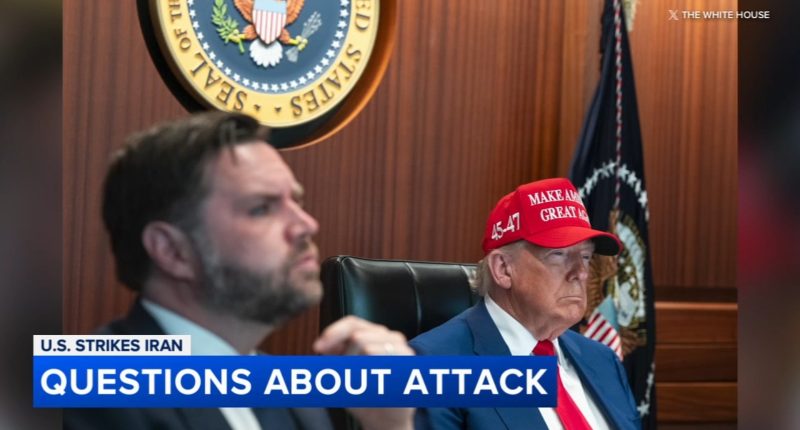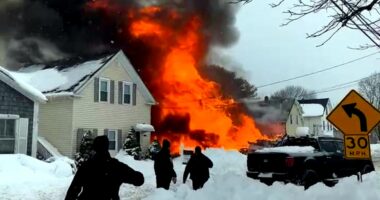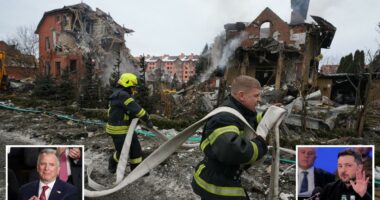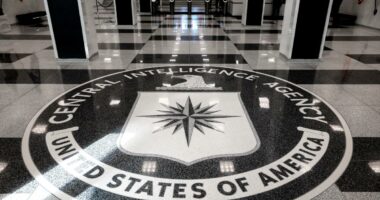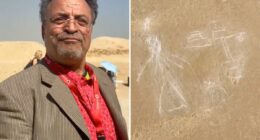Share this @internewscast.com
CHICAGO (WLS) — Governor JB Pritzker took part in a briefing with fellow American governors Sunday, led by Department of Homeland Security Secretary Kristi Noem, regarding rising tensions in the Middle East.
On Monday, Iran launched missile attacks against a U.S. base in Qatar following additional strikes exchanged between Israel and Iran overnight, a day after Operation Midnight Hammer.
ABC7 Chicago is now streaming 24/7. Click here to watch
Homeland Security and the FBI are warning state and local officials that the strikes have “raised the threat environment.”
The Chicago Police Department said it is closely monitoring the events in the Middle East.
“Though there is currently no actionable intelligence for Chicago, we are in close communication with federal and state partners to receive the latest updates and make sure there are adequate resources available across the city,” stated CPD.
Illinois State Police released a statement, saying, “The ISP Statewide Terrorism and Intelligence Center (STIC) works with local, state, and federal law enforcement and public safety partners to monitor for and identify potential threats. At this time, no credible threats have been identified and we remain vigilant. The public is essential in our collective safety and security. We ask the public to report any suspicious activity to local authorities, who are in direct communication with STIC.”
An Northwestern University released a statement, saying, “Northwestern University leadership in Evanston has been in consistent contact with our counterparts in Doha. The University has measures in place to ensure all faculty, staff and students on our Doha campus are well-informed and safe. The safety and security of our community is and remains our top priority.”
Pritzker said on X that he’s keeping a close eye and is in consultation with federal authorities.
But there are no known local threats at this time.
There are major questions about how much of Iran’s nuclear program was destroyed in Saturday’s attack.
President Donald Trump says the facilities were “obliterated.”
The chairman of the Joint Chiefs of Staff says it’s too early to tell the full scope.
“Final battle damage will take some time, but initial battle damage assessment indicate that all three sites sustained extremely severe damage and destruction,” Gen. Dan Caine said.
Satellite imagery shows the damage to the three nuclear facilities targeted in the attack.
The Trump administration has said the Fordow facility, built underground, was a key target.
That’s where the 30,000-pound “bunker buster bombs” were dropped.
From the sky, the only damage that can be seen are the holes the bombs created, when they dug into the ground before exploding.
“We really can’t know what went on underneath the ground in Fordow. The president called it a monumental success, but it all happened 200 feet down, and we can’t see with satellites,” Col. Steve Ganyard said.
Israel and Iran traded missile attacks Monday before Trump announced a ceasefire agreement between Iran and Israel.
In one video circulating online, a large blast can be seen at the site of an electrical substation in Israel.
It comes as Trump floated the idea of a regime change in Iran.
Trump posted online, “If the current Iranian regime is unable to make Iran great again, why wouldn’t there be a regime change?”
The vice president has said that’s not their goal.
“Well first of all, we don’t want to achieve regime change; we want to achieve the end of the Iranian nuclear program,” JD Vance said.
“If they refuse to engage in diplomacy moving forward, why shouldn’t the Iranian people rise up against this brutal terrorist regime? That’s a question the president raised last night,” White House Press Secretary Karoline Leavitt said Monday morning.
Locally, organizations who oppose U.S. involvement said there’s a planned anti-war protest at 5 p.m. Monday at Federal Plaza.
Dr. Louis Kraus, who leads Rush’s child and adolescent psychiatry efforts, said it’s normal to feel anxious or fearful amid escalating tensions in the Middle East.
How to process fear and anxiety amid escalating tension in the Middle East.
He gave some tips Monday on how to process these “out of our control” events.
Kraus said it’s important not to show anxiety to children, wait for them to bring up concerns and offer them assurance everything will be OK.
Full statement from Pritzker’s office:
“Amid the ongoing conflict in the Middle East, Governor Pritzker has been receiving briefings from federal, state, and local law enforcement to continue assessing potential physical or cyber threats that could impact Illinois.
On Sunday, June 22, Governor Pritzker participated in a U.S. Department of Homeland Security (DHS) public safety and security briefing for Governors. DHS issued a new National Terrorism Advisory System Bulletin outlining a heightened threat environment in the United States, which includes providing information and resources for local authorities and public safety officials. Today, Monday, June 23, Governor Pritzker spoke with officials from the Illinois State Police, Illinois National Guard, Illinois Emergency Management Agency, and other local law enforcement.
Governor Pritzker will continue receiving briefings and ensuring law enforcement remain vigilant to protect the safety of all Illinoisans.”
Statement from Illinois Department of Innovation and Technology (DoIT) to state employees:
“With everything happening in the world, it’s important we stay mindful of the digital threats that can accompany times of uncertainty. While there is currently no known or specific threat to the State, adversaries often look to take advantage of distraction, confusion, or global events to launch cyberattacks – notably using phishing, social engineering, and/or direct attacks on our systems.
Your vigilance is one of our strongest defenses.
If something doesn’t seem right – whether it’s an unexpected e-mail, a strange login alert, or anything that just feels “off” – please don’t ignore it.
What you can do:
1. Be cautious with email attachments and links, even if they appear to come from known sources.
2. Don’t share your username and password – with anyone, ever.
3. Report anything unusual or suspicious to DoIT.Security@illinois.gov immediately.
Cybersecurity is a shared responsibility, and your attention protects everyone. Thank you for doing your part to keep the State of Illinois safe.”
Copyright © 2025 WLS-TV. All Rights Reserved.
